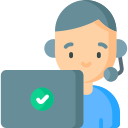
How to Start Programming: The Step-by-Step Guide for Beginner
The role of technology has changed quite a bit in the last 20 years or so. Slowly but surely, computers have permeated nearly every part of our lives, from what we buy, to how we get from place to place, to how we work, to where we eat after we clock out for the day. For this reason and many others, coding is one of the most valuable skills you can build.
Already have your mind set on becoming a developer? Then there’s probably one question on your mind: how to start coding? It can be confusing and hard. But, don’t worry if you don’t yet know anything this guide will help you.
-
Why Do You Want to Learn How to Code?
- Take a few minutes (or a day) to think about the reasons, your real motivation why you want to learn a programming language, just be honest with yourself and you will find the answer.
- Be honest with yourself.
- Your answer can help determine which programming language(s) you should master, as well as what sort of commitment in time and money your goal may require.
-
Choose the Right Programming Language
- Once you figure out why you want to code, you can more easily pinpoint which programming language you should tackle.
- If you decide that a language does not suit your needs, you can always move on to a new language.
- Once you become comfortable with one programming language, you’ll be able to pick up the next one that much faster
-
Learn the Language
- Next step is to learn the language you choose.
- You can learn the language through many methods, like Interactive Websites or learn through Video Tutorials on YouTube or you can learn from your school/college or through books.
- Take examples of the programming language from the source you choose and put them into your interpreter. Try changing the examples and making the program do different things.
-
Start with The Basic
- Some core principles exist in every programming language or role. Logic, flow-control, comparisons, variables, data structures, and more are universal concepts you will need to know and understand in any coding context.
- Taking time to understand the fundamental building blocks of programming languages will open you up to coding in almost any way you wish down the line.
-
Practice Makes Perfect
- The more you practice, the better you will get. Coding requires hands-on experience and skill, so try writing some simple programs on topics you enjoy.
- Learn the formatting which is very important (You have to learn the necessary formatting before you can start coding, or you’ll end up with a jumbled mess of compiler errors.)
Are You Interested in Learning More about Coding?
You need further your knowledge about Information Technology, with this knowledge you can pursue career as a web developer. You can start your journey with Swiss German University.
Students who study IT at SGU will also be prepared to take a professional certification of their choice. This certification would expand their knowledge and allow a smoother entrance to the job market. In the future, graduates with an IT Bachelor’s degree may enjoy excellent, diverse, and global employment opportunities. In the technopreneur space, not an invention but innovation is the key to achieving success.
Download our curriculum by clicking the button at the end of this article.
About SGU
SWISS GERMAN UNIVERSITY (SGU) is an international university in Indonesia, was established in 2000 as a joint effort between Indonesia, Germany, Switzerland, and Austria. We are the pioneer in offering international curricula in Indonesia. Qualified students can graduate with a Double Degree from Indonesia and Germany, which SGU provides in cooperation with partner universities; surely a valuable tool for your future careers. Ever since its establishment, SGU has been dedicated to delivering quality education in line with international standards and aims to develop skilled professionals who meet the demands of the industry. In order to achieve its objectives, SGU offers quality-oriented learning through 12 Bachelor’s Degree Programs and 4 Master’s Degree Programs ranging from Engineering, Information Technology, and Business to Life Sciences and Social Sciences. Furthermore, with small class sizes, and with English as the medium of instruction, you can look forward to pursuing your tertiary education and degree with full confidence.
Curriculum Back